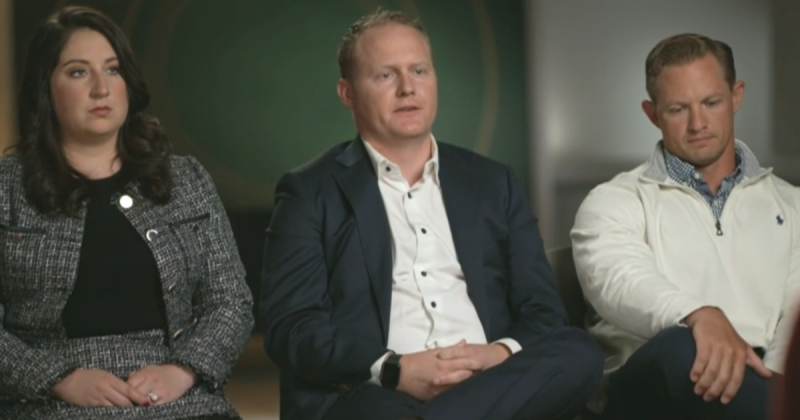U.S. soldiers injured by Iranian ballistic missiles denied the Purple Heart award - CBS News
By: Catherine Herridge, Michael Kaplan (CBSNews)



By Catherine Herridge, Michael Kaplan
November 11, 2021 / 7:43 AM / CBS News
Injured U.S. soldiers denied Purple Hearts Injured U.S. soldiers denied Purple Hearts06:15
Platoon Sergeant Daine Kvasager was part of a skeleton crew left to defend the Al Asad Air Base in Iraq on January 8, 2020. Days earlier, the U.S. had killed the powerful Iranian General Quasem Soleimani, head of the elite Quds military force and the man behind deadly attacks on American bases — but the ballistic missile attack in response would be the biggest against American forces in history.
Iran leveled the base with 11 warheads, each weighing 1,600 pounds.
"It rocked everything," said Kvasager, who told CBS News he was knocked over by a shockwave after one of the missiles hit about 150 feet from him. "The whole earth shook."
Platoon Sergeant Daine Kvasager Courtesy Daine Kvasager
Miraculously, no one was killed. But Kvasager and members of his team, called Taskforce Scarecrow, suffered traumatic brain injuries, or TBIs.
He used to help run armed drone operations as part of the unit, but the now 31-year-old struggles with vision and hearing problems and suffers from constant headaches and memory loss. He says he can no longer do his job.
"The person I was prior to a traumatic brain injury, he's gone," Kvasager said. "There's parts that remain. The pieces are all still there, just — yeah, he's not coming back."
A CBS News investigation found Kvasager is one of dozens of soldiers injured in the attack who have not been recognized with the Purple Heart and who have been denied the medical benefits that come with it, despite appearing to qualify.
Kvasager's superior officer Captain Geoffrey Hansen, 32, helped lead Taskforce Scarecrow and told CBS News the soldiers met the military's eligibility requirement for the award.
In an October 6 letter obtained by CBS News, their commander, Colonel Gregory Fix, urged the Army's command that handles awards to reverse course and "review and/or reconsider the Purple Heart award packages for all Soldiers injured at Al-Asad airbase on January 8, 2020 who have not received the Purple Heart as a result of this attack."
"Throughout my whole military career, I was always told 'we take care of soldiers above all else'," said Hansen, who recently was honorably discharged from the military and is attending business school. "It shocks me that we have failed to do that in this situation."
After CBS News contacted the Department of Defense, an Army spokesperson confirmed the award packets are now being reconsidered by the Army's Human Resources Command, or HRC.
"HRC will evaluate each award nomination, to include posthumous submissions, expeditiously and on their individual merit in accordance with Army regulations," the spokesperson said in a statement.
One of the submissions is for 22-year-old Jason Quitugua, who took his own life last month. Quitugua, who was promoted to sergeant posthumously, defended the base when the missiles struck and was diagnosed with a TBI.
"He struggled, you know, like we all are, like I am," said Kvasager, who served with Quitugua. "It's just heartbreaking."
Jason Quitugua, who was injured in a 2020 Iranian attack on Al Asad Air Base, took his own life in 2021.
Politics at play?
Current and former soldiers from Taskforce Scarecrow question whether politics played a role in the Army's failure to award the Purple Heart to soldiers who they say qualified for it.
Shortly after the attack, Fix submitted 56 soldiers diagnosed with TBIs for the Purple Heart, but only 23 were recognized with the award. Hansen said they all should have received the award. He said they all met the eligibility requirements set out in Army regulations because the attack was launched by a hostile foreign force and caused "persistent … impaired brain functions for a period greater than 48 hours from the time of the concussive incident."
In a statement issued in May 2020, the Department of Defense said the final decision to approve Purple Hearts was made by Lieutenant General Pat White, the three-star general who oversaw the entire theatre.
In the statement, the department wrote, "it is important to note that a Traumatic Brain Injury (TBI) diagnosis does not automatically qualify a Service Member for the Purple Heart" and that the "process was designed to be a fair and impartial proceeding that evaluated each case in accordance with applicable regulations."
Hansen and other soldiers who survived the attack told CBS News they believe an arbitrary standard was applied — the soldiers who were medically evacuated from Iraq received the award, but the ones who stayed behind to support the mission were not. He said that's not how it's supposed to work.
"The Army regulation that explains the criteria for a Purple Heart very clearly says it's not up for judgment," said Hansen, who was turned down for the award. "It's an entitlement and it's something that is earned by injury."
After bringing their concerns up the chain of command, Hansen said he and Fix were told to stop asking about the soldiers who did not receive the Purple Heart.
"The messaging I was getting was just the political situation wasn't going to support more approvals," Hansen said.
In the October 6 letter, Fix wrote, "I was also directed not to inquire about the remaining awards or resubmit those awards."
The soldiers CBS spoke with said after the attack, there was pressure to downplay the growing injuries to avoid a further escalation with Iran and avoid undercutting former President Trump.
A week after the attack, Trump was asked about the soldiers' injuries at a press conference. He said he "heard they had headaches" and "I can report it is not very serious."
Hansen said those comments indicated to him that the administration wanted to keep the casualty numbers low.
"Purple Hearts are an indication of a casualty," he said.
In response to a CBS News inquiry, a military spokesman said a review board backed by medical professionals made a recommendation to White in each case, and cases underwent "rigorous review." The spokesman said the evaluation is an apolitical process, and they are not aware of any direction given to soldiers to downplay their injuries or to commanders not to inquire or resubmit the remaining Purple Heart awards.
White said those recommendations were reviewed by a board of senior leaders before the final decision, and standards were applied uniformly.
"Our regulations also allow for a process in which commanders can request reconsideration of such standards-based award decisions, which we exercise frequently," White said.
Hansen and other soldiers said they are speaking outside the chain of command as "an absolute last step" and to help soldiers who may not be able to speak up, due to their more junior positions.
"It kills me to be on the news talking about this," Hansen said. "There are so many processes in place that I would think that could fix this. And it just seems like no one has that appetite to do it."
A tale of two soldiers
Mike Pridgeon, 35, and Hailey Webster, 26, both suffered TBIs in the attack. They each sheltered in bunkers meant to defend against small explosives, not ballistic missiles the size of a truck.
Al Asad Air Base in the wake of a 2020 attack by Iran. Courtesy Daine Kvasager
An intelligence officer, Webster told CBS News it feels like her brain "has short-circuited" and she has been forced to medically retire from the army due to her injuries.
"I can do things for short spurts," Webster said, whose job entailed poring over intelligence for up to 12 hours a day. "My brain still works but it doesn't have any stamina, and it very frequently just stops working. And so, it's very difficult to do your job — and then you add any stress on top of it, and it makes it almost impossible."
Pridgeon is still in the military, but said he suffers from constant headaches, memory loss and vision issues.
"My wife will say I used to be so articulate, but now I'm almost like a stroke patient," Pridgeon said.
Both Pridgeon and Webster lived through the same ballistic missile attack, but only Webster, who was medically evacuated, received the Purple Heart. She said she is speaking out because she feels guilty that she received the award, while fellow service members who suffered the same injuries did not.
"They came back, and I saw them and how much pain they were in," Webster said. "It kills me to see them and not have that recognition."
The Purple Heart carries lifetime benefits, including priority medical care at Veterans Affairs hospitals, home loan benefits, and preferences for federal hiring. Some states offer Purple Heart recipients tuition waivers for undergraduate and postgraduate university programs.
"There's been so many times going through the retirement process that they said, 'Oh, you have a Purple Heart? Oh, that makes this easy,'" Webster said. "It just proves you were injured in combat by enemy action."
Pridgeon said for him and others, it's personal, adding the army has sent a message to injured soldiers that their sacrifice was "insignificant" and "not worth consideration."
"It's not something you ever want to earn," he said. "But it's something that my son can see as to why I am the way I am, why I changed."
Catherine Herridge
Catherine Herridge is a senior investigative correspondent for CBS News covering national security and intelligence based in Washington, D.C.
Thanks for reading CBS NEWS. Create your free account or log in
for more features. Continue Please enter email address to continue Please enter valid email address to continue







A sad commentary on how we treat our military.
They're political pawns. Nothing new, unfortunately.
to republicans, dead heroes are a lot less expensive...
Seems like this is a case of the higher ups covering their ass for incompetence.
Sure looks that way.
So, the reason they didn't get the Purple Heart is because our gov didn't want to treat their TBI and so they decided that their injury was a non injury. Did I get that right?
That's how I read it.
We love our guys and gals in uniform, until they cost too much or make our use of our military in furthering foreign policy look bad. Then we leave them high and dry.
If I remember correctly the US military downplayed this incident because it had been a massive intelligence failure.
The president at that time stated there were only some headaches from the attack nothing serious.
TFG didn't want to bear any responsibility for the consequences of the attack on the Iranian general. So, as usual, he lied. Whether the attack on the Iranian general was justified or not is another question. It may well have been. But there are always consequences for military action and TFG tries to evade responsibility for everything. He is the worst.
If the injuries were caused by bone spurs, Trump would have knocked people out of the way to sign the paperwork.
That seems to be the case.
I didn't know a purple heart recipient gets some kind of extra benefits?
The armed forces waste more than enough money and should help these people.
Yes, they do get extra benefits and they and these soldiers should be have the purple heart and the benefits.
after giving the brass boner pills on demand, there's probably not much money left over for the grunts.